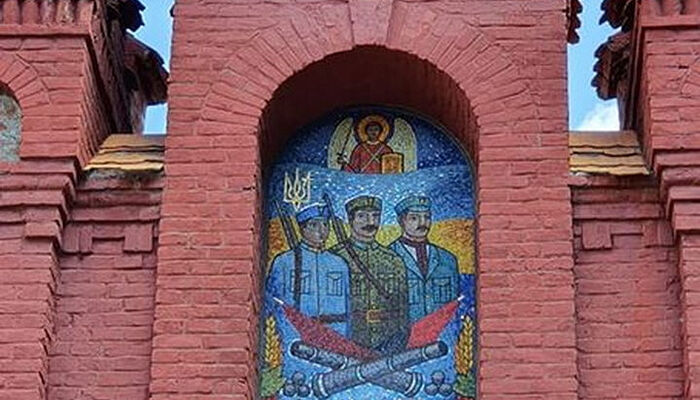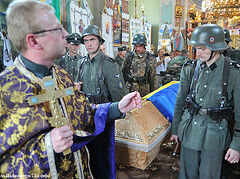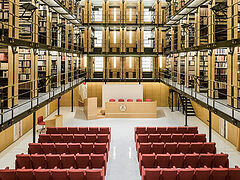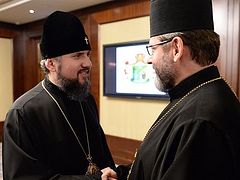Truskavets, Lviv oblast, August 4, 2020
In the beautiful city of Truskavets, historically Truskawiec, in the Lviv region of Western Ukraine, an unpleasant sight was seen over a Uniate church of St. Nicholas.
The Uniates displayed a strange sort of nationalist “trinity mosaic”, displaying above an icon of the Mother of God three Ukrainian soldiers from three different militant organizations from twentieth century Ukrainian history.
The Union of Orthodox Journalists quotes Ukrainian historian and publicist Vasyl Rasevych as saying:
“This “trinity” symbolizes the indivisible unity of the Ukrainian Sich Riflemen, Ukrainian Galician Army, and Ukrainian Insurgent Army [allied with Hitler in WW2—O.C.] Different contexts and even opposite ideological orientations are set aside. All three are under the omophorion of the Mother of God. Such symbols should be simple, like the glory of the Communist Party. You don't need to understand them. You need only believe in them.” Rasevych writes, commenting on the ideologically colored mosaic in the temple.
Besides being an almost blasphemous analogy with the Holy Trinity, such a statement is a subversion to Ukrainian nationalist ends of a concept running deep in the historical consciousness of the three inseparable nations that sprung from the one baptismal font of Holy Rus’ in Kiev—Russian, Belorus, and Malorus, or Ukrainian. He tops off his strange trinitarian idea with lines taken from the famous Russian poet Feodor Tiuchev, “Russia cannot be measured, it can only be believed in.”
This sort of confusing ultra-nationalism is typical of both the Uniates and the Ukrainian schismatics who also build nationalist-style churches, and serve with the Uniates at funerals honoring Nazi SS members.
This also displays a confusion between patriotism and nationalism, as described in an article analyzing the difference between the Ukrainian Orthodox Church and the schismatic worldview. For the schismatics and uniates, it seems to many that nationalism is their primary raison d'être—their reason to exist, and their religious views exist simply to sanctify their nationalism.
The nationalism of the Uniates can also be at times completely self-contradictory, as Uniate leader Major Archbishop Sviatoslav Shevchuk practically considers Taras Shevchenko a saint, calling on all Ukrainians to read his works, among which include many poems which express extremely anti-Uniate sentiments, and even glorify violence against Uniates.
On this subject, OrthoChristian.com recently published an interview with Ukrainian-American Hieromonk Constantine (Simon) Ph.D., the former Vice-Rector of the Pontifical Oriental Institute, who converted to Orthodoxy, and being an expert on Slavic history and a former Jesuit, he gave an in depth description of the rise of Neo-Nazism among Ukrainian uniates, which helps explain why we constantly see such issues in Galicia. This example is simply yet another of many.





